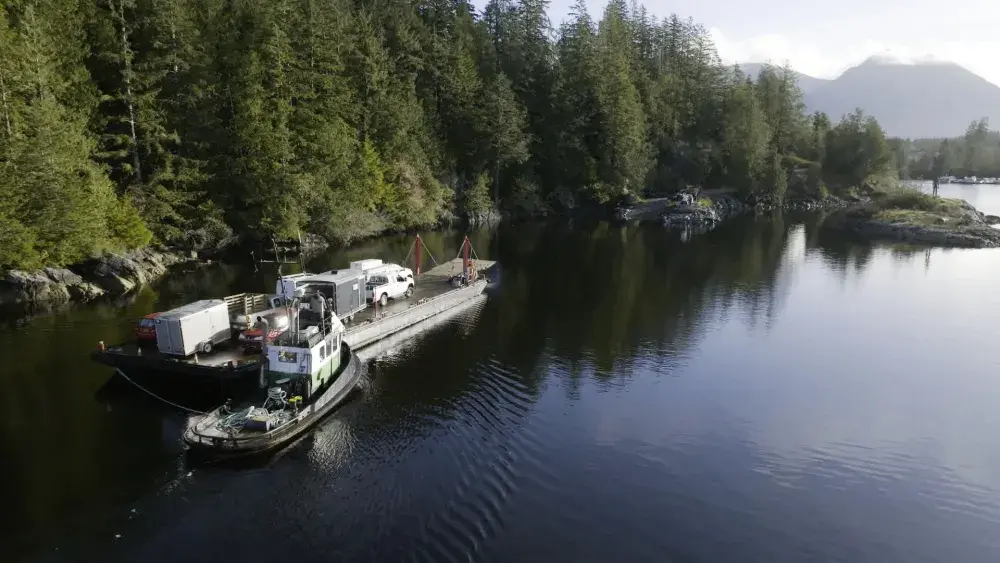A founding member of a network serving coastal communities in Clayoquot Sound says that Canadian Indigenous communities are underserved when it comes to government funding for animal welfare programs, and this contributes to the problems seen on many reserves.
James Rogers co-founded the CARE (Coastal Animal Rescue & Education) Network. He’s spent the last 12 years building animal welfare supports with volunteers who go into outlying communities to assist with animal care concerns and to remove unwanted pets. Based in Tofino and Ucluelet, the CARE Network serves those communities as well as First Nations villages in the area, including Ahousaht and Tla-o-qui-aht reserves.
The network assists First Nations with bylaw enforcement work around animal control and they rehome unwanted pets. They have arranged wellness and spay/neuter vet clinics on reserve over the years, which has helped - but it’s not enough.
There are chronic challenges for pet owners living in remote coastal communities, particularly those with low incomes and lack of transportation. Even though veterinary care is considered an essential service, outlying communities remain underserved.
It was the COVID-19 pandemic that shone a spotlight on the lack of veterinary care in remote communities. In British Columbia, animal care was deemed an essential service.
According to Rodgers, Tla-o-qui-aht administration secured a grant for improving resilience following the COVID-19 crisis. Communities were faced with isolation and had to find creative ways to be self-reliant when the world came to a virtual halt at the height of the pandemic.
“We are now involved in starting a new organization, that has only Indigenous nations as its membership, to shift the 150-year inequitable status quo of how the federal and provincial governments allocate animal-related community safety resources,” said Rodgers.
The new Indigenous-led organization will be called ACCESS, which stands for the Animal Care & Community Empowered Safety Society. It is intended to fill gaps that one other major organization, the BC SPCA, is not reaching.
In existence for 129 years, the BC SPCA has more than 40 branches and veterinary facilities in the province. Emily Thorner of the BC SPCA says they do not receive regular annual funding from the government, however, they sometimes receive grants for capital projects. Thorner says the BC SPCA recently received $12 million to cover the cost of four building projects.
The BC SPCA contracts with municipal governments, receiving fees for animal control services. They are also supported by donations and fundraisers.
“We want to invite any nation interested in improving their community health and safety, as it relates to animal challenges, to get in touch and hopefully become a member of ACCESS,” said Rogers, noting that joining the cause is free. “With our non-profit animal service provider partners, like Mission Pawsible, ACCESS will continue to help develop a non-profit veterinary sector in B.C. to bring veterinary resources to chronically underserved communities.”
The goal, says Rodgers, is to get the pet population under control and bring animals to a healthier condition.
According to Rodgers, ACCESS will be a place First Nations can bring their perspective and take part in decision-making at higher levels. The new society seeks to increase access to animal-related resources for remote communities, especially Indigenous communities.
“We want to invite any nation interested in improving their community health and safety, as it relates to animal challenges, to get in touch and hopefully become a member of ACCESS,” said Rodgers. “As a collective force, we will disrupt the inequitable status quo and enact the changes needed to keep all members of our communities, whether they have two legs or four, safe and healthy, as our future wellness is intertwined.”
Nuu-chah-nulth First Nations representatives will introduce the idea at the July 2024 Assembly of First Nations meeting in Montreal. They will be seeking Canada-wide First Nations support for the organization. The resolution, titled “A National Strategy on Animal Care and Control in First Nations”, will seek to gain support of delegates at the AFN level.
“For now, our focus is on British Columbia but we hope to see it go nation-wide,” said Rodgers.
The ACCESS board of directors includes Dr. Emma Jackson, an Indigenous veterinarian based in Alberta. Also on the board are Shawn Quick of Tla-o-qui-aht as well as Dr. Tara Atleo and Deputy Chief Sabrina Campbell of Ahousaht.
To learn more about ACCESS or to join, visit www.increasedaccess.org
ACCESS is a registered BC non-profit organization with federal charitable status and will issue tax receipts for donations. Email info@increasedaccess.org for more information.

